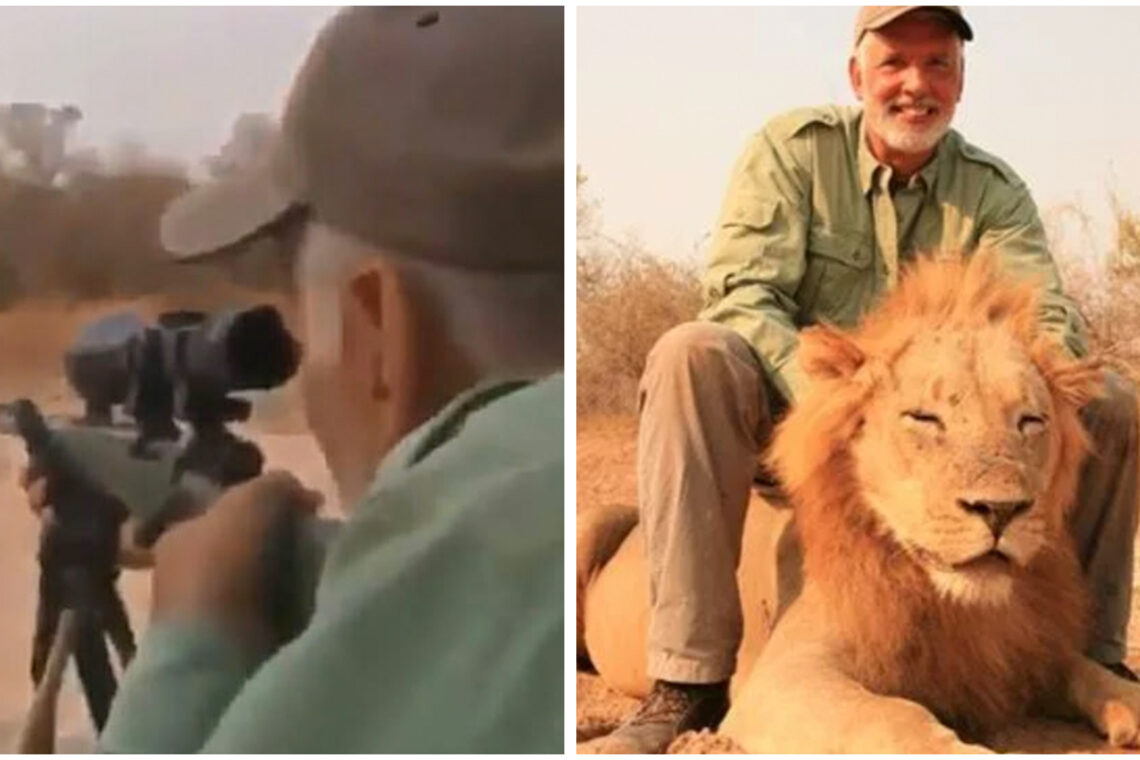
An incident involving a man who approached a sleeping lion and shot it multiple times has ignited widespread outrage and condemnation globally. This disturbing episode highlights the intense emotions surrounding the contentious issue of trophy hunting, an activity many deem unjustifiable.
The individual in question fired three shots at the lion, the first of which roused the creature from its slumber, eliciting an agonizing reaction as it arched its back in pain. The man’s subsequent actions, which included filming a video to showcase his “achievement,” have further fueled public indignation. The footage, now circulating widely, showcases not only the moment of the attack but also the celebratory demeanor of the hunter, raising serious ethical questions about the motivations behind such acts.
Critics have flooded social media platforms with their disapproval. One user aptly noted, “This is neither sports nor hunting,” capturing the sentiment of those who believe that this kind of behavior transcends traditional hunting ethics. The stark contrast between hunting as a means of survival and this act of killing for sport is a focal point of the criticism, emphasizing a disconnect between ethical hunting practices and the senseless slaughter of animals.

In the video, the hunter can be seen aiming at the dormant lion, receiving encouragement from a guide who instructs him on how to take the shot. As the lion writhes in pain from the initial bullet wound, the guide instructs the hunter to continue firing, revealing a disturbing camaraderie that blurs the lines between hunting and sheer cruelty. After the final shots are fired, the guide expresses his approval, laughing and congratulating the man on what he calls a “very nice lion.” This chilling exchange serves to underscore the insensitivity and callousness often present in trophy hunting scenarios.
Reports indicate that this particular incident may have occurred in Zimbabwe back in 2011. The man at the center of this controversy has been identified as Guy Gorney, a 64-year-old from Manhattan, Illinois. This revelation only deepens the public’s outrage, as it suggests that this is not an isolated incident but part of a broader pattern of behavior. Previous interviews have disclosed that Gorney has killed numerous big game animals throughout his hunting career, including elephants, leopards, and rhinoceroses.


In a 2015 interview, Gorney expressed a baffling perspective on hunting. He remarked on the disparity in public perception regarding different types of game, questioning why the killing of larger, more iconic species like lions and elephants garners more outrage than that of smaller animals such as deer. His statement, “But to me, either way, I’ve stopped a beating heart,” reveals a stark detachment from the ethical implications of his actions and highlights a troubling mindset prevalent among some hunters who prioritize personal satisfaction over conservation concerns.
The response to the video has been swift and vehement, with many condemning Gorney as a coward for targeting an unsuspecting animal. The footage has spurred a larger discussion about the morality of trophy hunting itself, prompting individuals to reflect on the broader implications of killing wild animals for sport. Regardless of whether the animal is sleeping or active, many believe that taking the life of a wild creature for mere bragging rights is fundamentally wrong.
The plight of lions is particularly pressing; according to conservationists, they could vanish from the African continent by the year 2050 if current trends continue. This alarming statistic has added urgency to the conversation surrounding trophy hunting, as advocates for wildlife preservation argue that the practice undermines conservation efforts. The loss of such majestic creatures not only impacts biodiversity but also disrupts ecosystems and cultural identities tied to these animals.
The outrage surrounding this incident is not merely an isolated reaction but part of a broader movement advocating for the protection of wildlife and the promotion of ethical hunting practices. Many conservationists are calling for stricter regulations on trophy hunting and greater accountability for hunters who engage in such controversial practices. The idea that a single individual can take the life of a powerful animal for the sake of a photograph or a fleeting sense of accomplishment is deeply troubling to many, who argue for a shift in values towards coexistence and respect for nature.
The fallout from Gorney’s actions serves as a poignant reminder of the ongoing struggle between conservation efforts and the desires of trophy hunters. The response from the public is a testament to a growing awareness of the ethical considerations surrounding hunting practices. As more individuals speak out against such displays of insensitivity, the hope remains that this dialogue will lead to a more compassionate approach to wildlife management and a recognition of the intrinsic value of all living creatures.
In conclusion, the controversy surrounding the man who shot a sleeping lion reflects deep-seated issues within the realm of trophy hunting and wildlife conservation. The widespread outrage is a clear signal that society is evolving in its understanding of ethical hunting and the responsibilities that come with interacting with the natural world. As this discourse continues, it is imperative that we advocate for a future where respect for wildlife takes precedence over personal gratification, fostering a harmonious coexistence with the magnificent creatures that share our planet.